Benzoyl peroxide is one of the most commonly used acne treatments. It comes in many forms, including gels, washes, and creams.
It works by infusing oxygen inside the pores and killing the overgrowth of bacteria responsible for acne.
Benzoyl peroxide is also a keratolytic agent, which means it helps to break down the keratin in the skin that can lead to clogged pores and closed comedones.
Therefore, while benzoyl peroxide can be a good treatment for closed comedones, there are a few things you need to know before introducing it into your skincare routine.
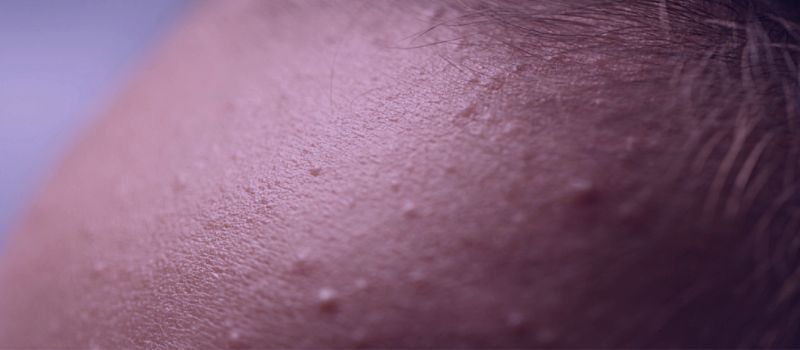
What are Closed Comedones And What Causes Them?
Closed comedones, also known as whiteheads, are non-inflammatory acne lesions that occur when a pore becomes clogged.
This happens when sebum and dead skin cells meant to lubricate the skin and shed from the surface accumulate inside the pore, creating a visible bump covered by a thin layer of skin.
Closed comedones often start out painless, but they can turn into painful, red pimples if bacteria starts proliferating inside the pore.
Closed comedones (whiteheads) are similar to open comedones (blackheads). Both are considered as grade I non-inflammatory acne, but they look different from one another.
Open comedones turn black when exposed to air, while a closed comedone remains “closed” because a thin layer of skin over the plug prevents it from opening up.
Here are a few main causes of closed comedones:
Oil-Based Skincare & Makeup Products
Heavy, oil-based skincare and makeup that clog the pores and prevent the normal sebum flow are the most common culprit of closed comedones.
The first step in treating closed comedones is eliminating products that trigger them.
Go through the ingredient lists of products you are using and try to figure out which ones might be causing you an issue.
Sites like INCIDecoder can be useful in helping you spot potentially clogging ingredients you should consider eliminating from your daily use.
Overly Dehydrated Skin
Overly dehydrated skin is another common culprit of closed comedones.
When the skin gets dehydrated from stripping products that contain drying ingredients such as alcohol, it tends to overproduce sebum at an abnormal rate to compensate for the dryness.
If your skin is overly dehydrated, consider going through your products and eliminating those that contain drying ingredients such as alcohol denat and astringents such as witch hazel.
Besides that, you should consider introducing a hydrating toner or a serum that will help you replenish hydration.
And lastly, don’t forget to seal all that hydration into your skin by applying a good, non-comedogenic moisturizer on top.
RELATED: Best Cleansers for Closed Comedones
Excessive Sebum Production
Excessive sebum production can be due to hormonal imbalances and mainly occurs when the male group of hormones known as androgens are overactive and stimulate the oil-producing glands.
Excessively oily skin doesn’t always cause full-blown cystic acne because acne is a bacterial condition and not necessarily an oily skin condition.
However, excessively oily skin definitely causes blackheads and closed comedones (or whiteheads) because the excess oil needs to be exfoliated and cleared out of the pores.
Sebum works great to lubricate the skin’s surface, but the problem starts when there’s too much of it inside the pores, which ends up blocking fresh sebum secreted by the sebaceous glands from traveling to the surface.
So, sebum = good, sebum stuck inside the pores = bad.
Accumulation of Dead Skin Cells
Accumulation of dead skin cells that don’t shed properly can also get mixed up with hardened sebum inside the pore and be another addition to the formation of closed comedones.
This is what we call “cellular debris” because these are things that should go to the skin’s surface and eventually be shed or cleansed instead of remaining inside the pore, where they can cause a bacterial issue.
Environmental Factors
Environmental factors such as pollution that accumulates on the skin and excessive sun exposure that alters the skin’s chemistry are also some of the main players in the formation of closed comedones.
Diet and Lifestyle
And lastly, food allergies and intolerance, as well as damaging lifestyle habits such as smoking, could also be the cause of closed comedones.
RELATED: Does Spicy Food Cause Acne?
How Does Benzoyl Peroxide Help to Treat Closed Comedones?
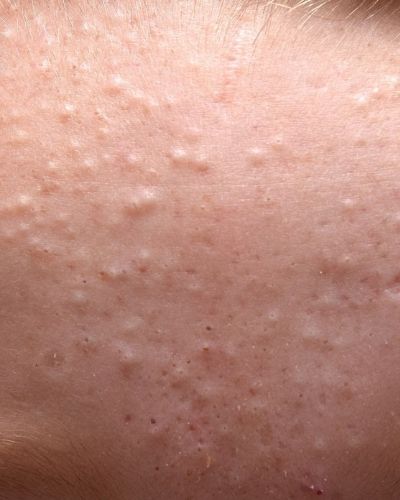
Benzoyl peroxide is a topical acne medication available over the counter in varying strengths.
It’s most commonly used to treat mild to moderate acne, but it can also treat closed comedones.
When benzoyl peroxide is applied to the skin, it travels deeper inside the pore and infuses it with oxygen.
An oxygenated environment isn’t ideal for bacteria to thrive in, which is why benzoyl peroxide destroys the overgrowth inside the pore.
Benzoyl peroxide is also a keratolytic agent, which helps break down the keratin plug causing the comedone.
This combination of effects makes benzoyl peroxide an effective treatment for closed comedones.
A study comparing benzoyl peroxide to other keratolytic agents such as salicylic acid and tretinoin showed that benzoyl peroxide had a decent effect on the removal of stratum corneum, thus balancing out the natural shedding process of the skin cells.
The study also concluded that while benzoyl peroxide is a great keratolytic agent, it’s a more suitable option for treating deeper, pustular acne.
It was also proven that benzoyl peroxide is very effective even with short-term contact.
This means that benzoyl peroxide washes, gels, and creams are effective even when staying on the skin for a few minutes, which is a preferred method of application for those who are dealing with excessively dry and sensitive skin.
Side Effects of Using Benzoyl Peroxide
While benzoyl peroxide can effectively treat both inflammatory and non-inflammatory acne, it definitely comes with its fair share of potential side effects.
Some of them include:
- Dryness.
- Sensitivity.
- Irritation.
- Itching.
This is why using a lower strength of benzoyl peroxide, such as 2.5% or 5%, is a better option for someone who has sensitive and reactive skin and is dealing with a compromised skin barrier.
Best Benzoyl Peroxide Products for Closed Comedones
Here are some of my favorite benzoyl peroxide products that you can use to combat closed comedones as well as inflammatory acne.
CeraVe – Acne Foaming Cream Cleanser – $15
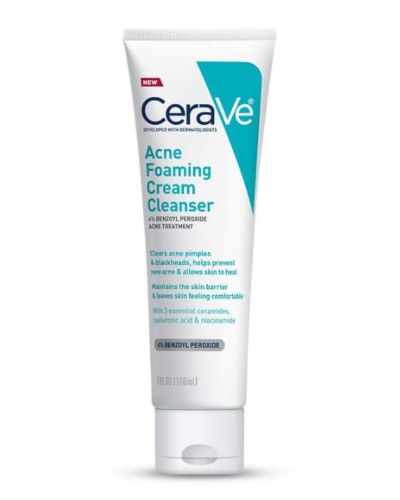
Best for oily, acne-prone skin.
CeraVe’s Acne Foaming Cleanser contains 4% benzoyl peroxide that helps dissolve sebum, unclog pores, and destroy the acne-causing bacteria.
However, this gentle cleanser also contains ceramides, which are waxy lipids that strengthen the skin barrier, hyaluronic acid that helps retain skin’s natural moisture, and niacinamide, which is a brightening and calming agent.
It is an excellent introduction to benzoyl peroxide, and it might be an ideal product for you if you have closed comedones and acne, but your skin is also very sensitive.
Paula’s Choice – 2.5% Benzoyl Peroxide Clearing Treatment – $19
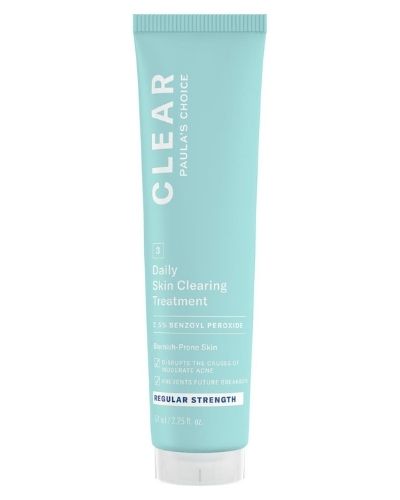
Best for all skin types.
Paula’s Choice Benzoyl Peroxide treatment is another excellent product that helps fight closed comedones as well as inflamed pimples while also containing soothing and hydrating ingredients to prevent potential dryness and irritation.
The product contains 2.5% benzoyl peroxide as an active ingredient, but besides that, it is also infused with bisabolol, which is a soothing agent derived from chamomile, as well as allantoin, which is a gentle skin conditioning agent with calming properties, making this product an excellent option for beginners with benzoyl peroxide or someone with more sensitive skin.
Acne.org – 2.5% Benzoyl Peroxide Treatment – $24
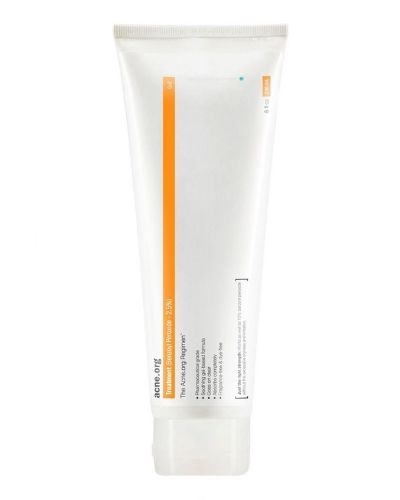
Best for all skin types.
The 2.5% Benzoyl Peroxide Treatment by Acne.Org is hands-down the best benzoyl peroxide treatment I have used so far.
That being said, it does require some getting used to, so if you are someone with very sensitive skin, you might be better off with some of the options mentioned above.
What I love most about this product is that it is a straight-to-the-point treatment with no bs or anything else. You apply it; you wait for a few minutes until it dries, and continue with a moisturizer or sunscreen in the morning.
Ingredients-wise, this product doesn’t contain hydrating ingredients, so if you opt for it, make sure to have a good moisturizer to pair it up with, or otherwise, your skin will be one hell of a dry mess.

My name is Simone and I am a certified skin specialist. I created this website to teach my readers how to take great care of their skin and I also like to occasionally share my honest opinions on skincare products I’ve tried. You can learn more about me here.
